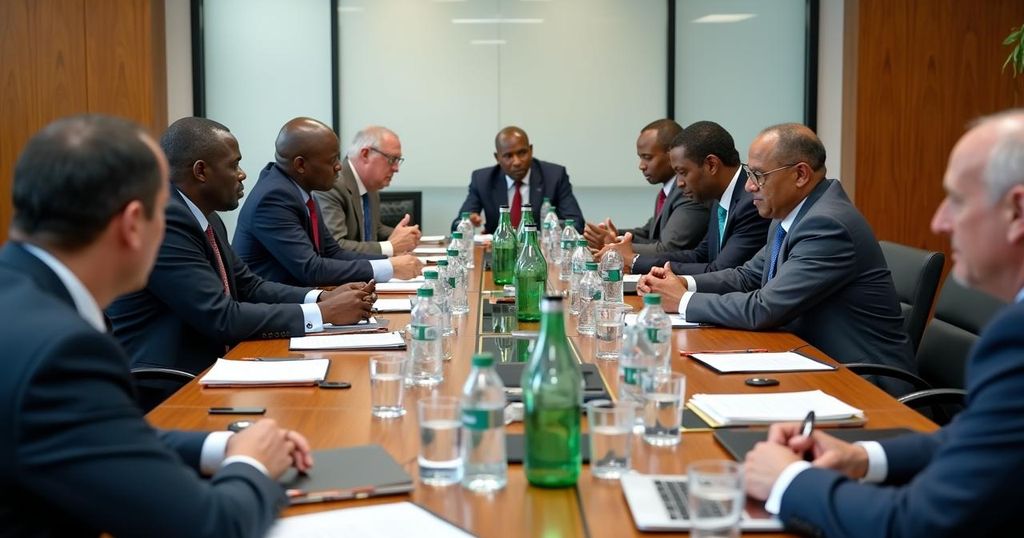Egypt Calls for Reconsideration of Cooperative Framework Agreement Among Nile Basin Nations

Egypt has called on Nile Basin countries to reconsider the Cooperative Framework Agreement, which it opposes alongside Sudan. The agreement has been signed by upstream nations, while Egypt emphasizes its vital need for Nile water, describing the situation as existential. Tensions are heightened due to Ethiopia’s Grand Ethiopian Renaissance Dam, which Egypt views as a threat to its water rights, insisting on a binding agreement regarding the dam’s operations.
Egypt has urged the countries of the Nile Basin to reconsider their position on the Cooperative Framework Agreement (CFA), commonly known as the Entebbe Agreement, which establishes the principles, rights, and responsibilities associated with the management and development of the Nile River. Despite being signed by several upstream nations including Ethiopia, Rwanda, South Sudan, Uganda, Tanzania, and the Democratic Republic of Congo, both Egypt and Sudan have expressed their opposition to this agreement. At a recent water event in Cairo, Egypt’s Irrigation Minister Hani Sewilam emphasized the necessity for the participating nations to reevaluate their stance. He stated that discussions should aim to encourage cooperation among the countries without compromising the interests of any particular nation. “Egypt’s position is fair and consistent with international river agreements enforced internationally,” he asserted, clearly indicating Egypt’s firm resolve not to cede any portion of its Nile water rights. Minister Sewilam further articulated the challenges faced by Egypt in terms of water supply, which he maintains is insufficient to meet the country’s needs. In agreement with Sewilam’s sentiments, Egyptian President Abdel Fattah Al-Sisi articulated the importance of safeguarding Egypt’s water resources, dubbing it an “existential issue”. Notably, he highlighted that the Nile River constitutes over 98% of Egypt’s water supply, thus signifying its critical relevance to the nation’s sustenance and survival. This ongoing discourse around the CFA underscores the deeper tensions concerning water usage related to the Nile River, particularly heightened by Ethiopia’s construction of the Grand Ethiopian Renaissance Dam (GERD) on the Blue Nile. Ethiopia regards the dam as vital for its economic development and maintains that it does not endanger downstream water allocations; conversely, Egypt perceives the GERD as a grave threat to its water share and demands a legally binding accord concerning the dam’s filling and operation.
The Nile River represents one of the world’s longest rivers, and its waters are a vital resource for multiple countries along its course, particularly Egypt and Ethiopia. The Cooperative Framework Agreement (CFA), signed by numerous upstream nations, aims to establish a governance structure for the equitable distribution and management of Nile water resources. However, Egypt and Sudan have expressed reservations about the CFA, fearing it infringes upon their established rights to Nile water, particularly in light of Ethiopia’s construction of the GERD, which aims to bolster Ethiopia’s energy capacity but threatens Egypt’s historical water allocations. These tensions have prompted calls for dialogue and reassessment of agreements to ensure that the interests of all riparian nations are adequately represented and protected. Egyptian officials underscore the existential nature of water resources for the nation, as they constitute the majority of the country’s freshwater supply.
In summary, Egypt has reiterated its strong position against the Cooperative Framework Agreement, advocating for a thorough reconsideration by Nile Basin countries to ensure cooperative management of the river that safeguards the rights of all nations involved. The ongoing situation surrounding the GERD exacerbates existing tensions, emphasizing the critical nature of Nile water resources for Egypt. The remarks from both Minister Sewilam and President Al-Sisi highlight the profound significance of the Nile River for Egypt’s survival and the urgent need for a negotiated resolution that upholds equitable water distribution.
Original Source: www.middleeastmonitor.com








